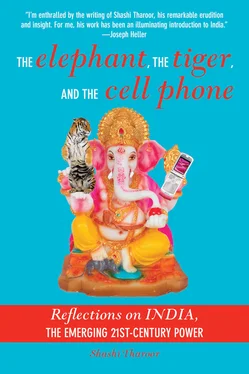Shashi Tharoor
The Elephant, the Tiger, and the Cell Phone: Reflections on India — the Emerging 21st-Century Power
To my wife, Christa,
in the hope of introducing her to my India
Preface. Why India Matters
On August 15, 2007, independent India turned sixty years old. What does the twenty-first century hold for India? And why should the answer to this question matter?
India is, in the words of the British historian E. P. Thompson, “the most important country for the future of the world.” I would not presume to make such a judgment myself, but in my book India: From Midnight to the Millennium and Beyond , I saw Indians standing at the intersection of four of the most important debates facing the world at the end of the twentieth century:
• The bread vs. freedom debate: Can democracy “deliver the goods” to alleviate desperate poverty, or does its inbuilt inefficiencies only impede rapid growth? Is the instability of political contention (and of makeshift coalitions) a luxury a developing country cannot afford? As today's young concentrate on making their bread, should they consider political freedom a dispensable distraction?
• The centralization vs. federalism debate: Does tomorrow's India need to be run by a strong central government able to transcend the fissiparous tendencies of language, caste, and region, or is a government best that centralizes least? Does every decision affecting Dharwar or Daman have to be taken in Delhi?
• The pluralism vs. fundamentalism debate: Is the secularism established in India's constitution, and now increasingly attacked as a westernized affectation, essential in a pluralist society, or should India, like many other third world countries, and almost all its neighbors, find refuge in the assertion of its own religious identity?
• The “coca-colonization” debate, or globalization vs. self-reliance: Should India, where economic self-sufficiency has been a mantra for more than four decades, open itself further to the world economy, or does the entry of Western consumer goods bring in alien influences that threaten to disrupt Indian society in ways too vital to be allowed? Should we raise the barriers to shield our youth from the pernicious seductions of MTV?
There is also a fifth debate that I did not discuss in my book, out of deference to the restraint expected by my then-employer, the United Nations: what one might call the “guns vs. butter” debate, the case for expenditure on defense against spending on development. With the twenty-first century having begun amid new threats of terrorism and renewed talk of nuclear confrontation, there is an ideological battle looming between advocates of military security (freedom from attack and conquest) and those of human security (freedom from hunger and hopelessness). It is difficult to deny that without adequate defense, a country cannot develop freely, according to its own rights; it is equally impossible to deny that without development, there will not be a country worth defending.
These are not merely academic debates: they are now being enacted on the national and world stage, and the choices we make will determine the kind of India our children will inherit in the twenty-first century. And since the century began with Indians accounting for one-sixth of the world's population, their choices will resonate throughout the globe.
In the present volume, I have tried to bring together material I have published in the last half-dozen years on subjects related to contemporary India, with these debates always (but not always explicitly) in mind. This book is not a survey of modern Indian history or politics; to become familiar with many of the principal events of the last six decades, the reader is advised to pick up India: From Midnight to the Millennium and Beyond . It is not “reportage,” though I do draw anecdotally upon my own travels and conversations in India and my exchanges with ordinary Indians who have communicated with me over the past few years. It is, I hope, both informed and impassioned, organized thematically but covering a broad range of subjects — from the very notion of “Indianness” in a pluralist society, to the lives of the men and women who helped shape my India, to whimsical and often tongue-in-cheek pieces on cricket or the national penchant for holidays. Almost all of these espouse a point of view: they reflect my taste for advocacy. Do not look here for dispassionate and neutral analysis. But each chapter, whether long or short, may be read in isolation.
India in the first decade of the twenty-first century is a young country, an optimistic country, a country marching confidently toward the future. This book reflects something of the assumptions and the worldview of the English-speaking, educated, professional, and entrepreneurial classes who are driving change and prosperity in India. But it is still a land of contrasts, where millions live wretched lives amid poverty and neglect even as India boasts the largest number of billionaires of any country in Asia, higher than either Japan or China. As one who loves and believes in my country, I have not allowed myself to forget those who have not been able to benefit from the dramatic changes taking place there. The book concludes on a sobering note that is not meant to undermine the message of the earlier chapters. Rather, it points to the necessity of entering the sunlit uplands with eyes wide open to the dangers lurking in the shadows.
This is a book oriented toward the future, but one in which issues of history and identity make more than an occasional appearance. Whether through elections or quotas, political mobilization in contemporary India has asserted the power of old identities, habits, faiths, and prejudices. Transcending them will be the major challenge for the Indian polity in the twenty-first century. India must rise above the past if we are to conquer the future.
Shashi Tharoor
New York, 2007
Introduction. The Elephant Who Became a Tiger
ONCE UPON A TIME, in a hot and humid jungle (though one with stretches known better for heat and dust), there lived an old elephant. She was a big, slow, lumbering elephant, with a long but not always happy history, and it was widely accepted that she had known better days. She was prone, the other animals knew, to lie back and scratch herself and talk nostalgically about the glorious past, her great accomplishments in times long gone by, but when the other animals listened they did not forget that that was really a long time ago. After all, for some time, the elephant's own stretch of the jungle had come under the sway of a fierce lion from far away. Despite her size and strength, the elephant had proved no match for the lion and had been cowed into submission, until the day when the lion, tired of subduing distant lands, had finally slunk away.
Despite this experience, the elephant tended to lecture the other animals, secure in the conviction that she had all the answers. She would raise her trunk and trumpet her views about the right way to do things, the correct manner of living, the ideal principles according to which to organize the jungle, and the other animals would nod politely, trying not to point out that the elephant herself hadn't done all that well, and that she was visibly becoming a bit mangy and flea-infested. She certainly was not the strongest animal in the jungle, for her way of doing things meant that she did not grow as big and strong as she might have. (The other animals, not entirely kindly, spoke somewhat patronizingly of “the elephant's rate of growth.”) She was large, of course, and that meant she could never be entirely ignored; as she came steadily, unblinkingly (and unthinkingly) on, the smaller animals at least had to get out of the way. But the number of animals who did as she did, and lived as she told them to, dwindled with each passing season.
Читать дальше












